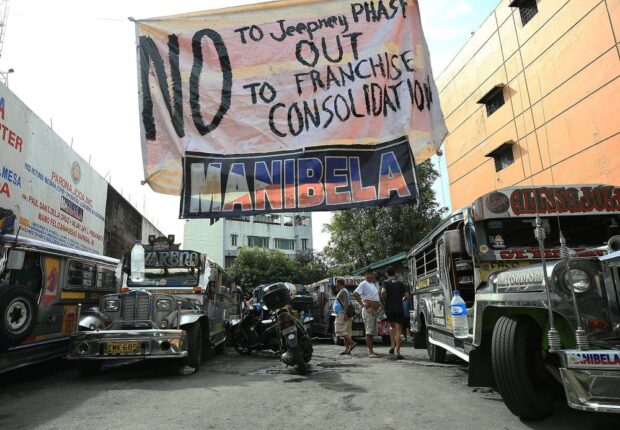
Drivers belonging to transport group Manibela with Paco-Rotonda Nagtahan route stage a protest on their terminal in Manila during the nationwide transport strike to protest the Dec. 31, 2023, deadline for public utility vehicle (PUV) operators to surrender their individual franchises and consolidate into cooperatives. (Photo by RICHARD A. REYES / Philippine Daily Inquirer)
MANILA, Philippines — Commuters in various parts of the country were taken by surprise on Monday morning by a transport strike that finally disrupted their routine, after earlier such protest actions against the government’s public utility vehicle modernization program (PUVMP) failed to gather enough support from drivers and operators.
Mar Valbuena, chair of transport group Samahang Manibela Mananakay at Nagkaisang Terminal ng Transportasyon (Manibela), claimed that “almost the entire NCR (National Capital Region)” and the regions of Cagayan Valley, Calabarzon (Cavite, Laguna, Batangas, Rizal, Quezon) Central Luzon and Western Visayas were affected by the strike.
But according to the Philippine National Police, the strike was held in seven areas in Metro Manila, joined by 385 protesters.
In Quezon City, commuters along Commonwealth Avenue, one of Metro Manila’s busiest thoroughfares, waited almost indefinitely for a ride amid early morning rains, as public utility vehicle (PUV) drivers plying that route joined the two-week strike set on Monday until Dec. 29, called by Manibela.
‘It’s different today’
Construction worker Celso Macalintal, 57, walked from his house near the Litex public market to his workplace near Quezon Avenue some 10 kilometers away.
“I waited for how many hours already. I decided to walk to work. My pay might be deducted. We could use that money since it’s Christmas,” he told the Inquirer.
“The transport strike is only a burden to us commuters,” Macalintal said. But he admitted not knowing the issues concerning the PUV drivers and operators.
Call center agent Angelina Reyes, 26, said she had just finished her shift at 7 a.m.
Unable to get a ride even through ride-hailing services because of the traffic volume, Reyes said she just waited until lunchtime at a fast-food restaurant, hoping to be able to go home by then.
“I’m used to this situation. But it’s different today,” she said, laughing. “I can’t book a ride, even with [motorcycle service] Angkas. I’m even willing to pay double. But there’s nothing, not even [the more informal ride service] habal.”
Lourdes Caspe, 68, left early enough that morning for a doctor’s appointment at East Avenue Medical Center.
But the senior citizen, who is hypertensive, decided to return home after a long wait.
Message to the president
At Commonwealth, there were several buses provided by the Quezon City government which offered free rides, but most of them were full. Valbuena said: “We’re doing this to send a message to the president, for him to hear our grievances because many will lose [their] jobs. We might spend Christmas in Malacañang to send the message more clearly.”
In line with the PUVMP, the government had set Dec. 31 as the final deadline for PUVs to join or organize cooperatives that would be issued consolidated franchises.
The Land Transportation Franchising and Regulatory Board issued last week a memorandum that in effect classifies vehicles of operators who fail to consolidate by Jan. 1 as illegal.
The agency said 153,787 out of 222,617 PUVs were already part of cooperatives as of last month. These include jeepneys, UV Express vans and mini buses.
But this leaves a still considerable 68,830 PUVs that have not yet been consolidated.
Valbuena expressed hope that President Ferdinand Marcos Jr. will scrap the program and allow PUVs that have not been consolidated to continue plying their routes after the deadline.